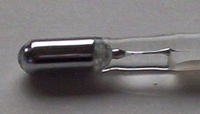
Photo from wikipedia
The health effects of mercury vapor exposure on the brain in volcanic areas have not been previously addressed in the literature. However, 10% of the worldwide population inhabits in the… Click to show full abstract
The health effects of mercury vapor exposure on the brain in volcanic areas have not been previously addressed in the literature. However, 10% of the worldwide population inhabits in the vicinity of an active volcano, which are natural sources of elemental mercury emission. To evaluate the presence of mercury compounds in the brain after chronic exposure to volcanogenic mercury vapor, a histochemical study, using autometallographic silver, was carried out to compare the brain of mice chronically exposed to an active volcanic environment (Furnas village, Azores, Portugal) with those not exposed (Rabo de Peixe village, Azores, Portugal). Results demonstrated several mercury deposits in blood vessels, white matter and some cells of the hippocampus in the brain of chronically exposed mice. Our results highlight that chronic exposure to an active volcanic environment results in brain mercury accumulation, raising an alert regarding potential human health risks. These findings support the hypothesis that mercury exposure can be a risk factor in causing neurodegenerative diseases in the inhabitants of volcanically active areas.
Journal Title: Environmental Geochemistry and Health
Year Published: 2020
Link to full text (if available)
Share on Social Media: Sign Up to like & get
recommendations!